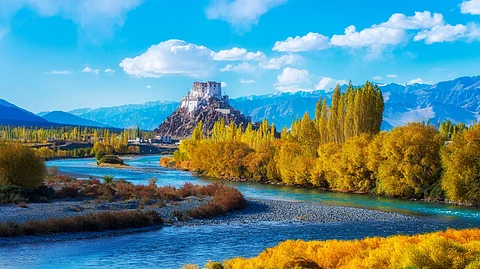
- Destinations
- Experiences
- Stay
- What's new
- Celebrating People
- Responsible Tourism
- CampaignsCampaigns
- SubscribeSubscribe
- Buy NowBuy Now

On April 22, a terror attack in the Baisaran Valley near Kashmir’s Pahalgam, situated in the northeast of District Anantnag, sent shockwaves across the country. Twenty-six civilians, many of them tourists, were killed in a brutal assault by five gunmen that has reignited security concerns in the region. Though the attack occurred over 500 kilometres from Ladakh, its psychological impact is being felt across the Himalayas.
According to the Tourism Department of Ladakh, 3,75,393 tourists visited the region in 2024. With April drawing to a close and Ladakh entering the heart of its peak season—spanning March to July—tourism stakeholders are on edge. With major festivals, blossom trails, and cultural experiences drawing both domestic and international travellers in April and May, the question now is: Will Ladakh's tourist season slow down?
As concerns about safety ripple across the travel industry following the recent terror attack in Pahalgam, tourism leaders in Ladakh are working hard to reassure travellers.
Tsewang Dorjay, President of the All Ladakh Tour Operators Association (ALTOA), acknowledged that there have been some cancellations—but stressed that the impact has been limited.
“Yes, we have seen a few cancellations,” Dorjay said. “But these were mainly from travellers who were planning to come to Leh via Srinagar by road. Given the circumstances, it's understandable that people are hesitant about travelling through Kashmir right now. However, clients flying directly into Leh or arriving from Manali have not been affected.”
Travellers have been reaching out with safety-related queries, Dorjay confirmed, but local tour operators and hoteliers have been actively addressing their concerns. “With proper guidance and communication, we’ve been able to reassure them,” he said. “We are nearly 500–600 kilometres away from where it occurred. Ladakh has never been on the terror map and continues to be a very safe place.”
To counter any misinformation, ALTOA and local authorities have ramped up their outreach. “We are spreading awareness through our official website, social media pages, and notifications issued by the administration. We want to make it clear that security is not an issue for tourists visiting Ladakh.”
When asked about upcoming events and cultural activities, Dorjay remained optimistic.
“There might be a small impact, but I believe that if everyone—officials, tour operators, media—shares the true picture of the situation in Ladakh, these events should not face any major setbacks.”
Despite the ripple effects of the recent tragedy in Pahalgam on Ladakh’s tourism sector, travel activities in Kargil, 215 kilometres from Leh, are proceeding as planned. Known for its natural beauty, historical significance, and adventurous opportunities, the region continues to be a major draw for visitors. The local tourism department remains committed to its efforts to promote the region and keep its attractions open to visitors.
“Everything in the tourism sector here is moving forward as normal. Daily meetings are keeping everything on track, and we remain confident that things will proceed smoothly,” said Jigmet Gyalson, an official at the Tourism Department in Kargil.
“There’s no need for additional measures. Even though Kargil is close to the border, there’s no danger,” Gyalson added. “Apart from the 1999 War, there have been no incidents related to terrorism or unrest. It has always been peaceful and secure for visitors.”
While tour operators across Ladakh have reported some cancellations post-Pahalgam, Gyalson believes the dip in footfall is temporary. “Many tourists are still visiting border areas like Turtuk and feel safe there. The situation on the ground is calm, and I think tourism will bounce back soon,” he said.
Stakeholders in the region—including hotel owners, guides, and local tour operators—have rallied to sustain momentum, creating digital campaigns and reels to spread the message that Ladakh remains open and welcoming. “They’re actively involved in promoting Ladakh on social media and encouraging tourists to visit,” Gyalson noted.
In a further step to reassure travellers, the Department of Tourism has launched a dedicated helpline and email address—ladakhtouristhelpline@gmail.com—for those seeking assistance or information. “We’ve already received several emails and have been responding promptly to assure visitors that Ladakh is safe for travel,” he said.
As the dust settles from the recent security concerns, the message from Ladakh is clear: the region remains one of the safest travel destinations in India. Dorjay, President of the ALTOA, reassured visitors, saying, “On behalf of Ladakh’s tourism community, we welcome our guests warmly and encourage you not to cancel or postpone your trip. Your safety and experience are our top priority.”
He also called for responsible media coverage, urging channels and social media pages to share accurate information. “A single misleading clip or piece of information shared online can have a negative impact on the tourism sector, not only in Ladakh but also in neighbouring regions. It's important for the media to exercise caution and ensure the accuracy of the information being shared, particularly in the wake of the recent Pahalgam terror attack.”
Looking ahead, Ladakh is eager to see travellers return, not just for its famous festivals and natural beauty, but to stand in solidarity with a region that has long been a symbol of resilience and hospitality.
Note: Outlook Traveller reached out to the Tourism & Culture Department, UT of Ladakh, for inputs, but had not received a response at the time of publication. This story will be updated as and when we receive a statement.
